Every year, new channels emerge promising to be the “next big thing” in digital marketing. From TikTok ads to influencer partnerships, the options can be overwhelming. Yet one channel continues to deliver consistent, measurable results for businesses of all sizes: email marketing. Unlike rented space on social media platforms, where algorithms decide what your audience sees, your email list is fully yours. That ownership makes it one of the most reliable tools for connecting with customers, nurturing leads, and driving sales.

For beginners, this is a golden opportunity. You don’t need a massive budget or years of experience to start running effective email campaigns. Today’s email marketing services offer drag-and-drop builders, ready-made templates, AI-powered personalization, and built-in analytics that take the guesswork out of marketing. The challenge isn’t whether you should use email, but which platform is the best fit for your needs.
This guide picks out 10 different email marketing platforms, each with distinct strengths. Some are perfect for e-commerce, some for developers, and others for businesses that need simplicity above all.
1. SendPulse – Multi-Channel Made Simple
SendPulse is more than just an email marketing tool—it’s a full-fledged communication platform designed to help businesses connect with customers across multiple touchpoints. In addition to bulk email campaigns, users can manage SMS, and even chatbots for popular messengers. This makes it a fantastic option for beginners who want to experiment with different channels without having to pay for multiple tools.
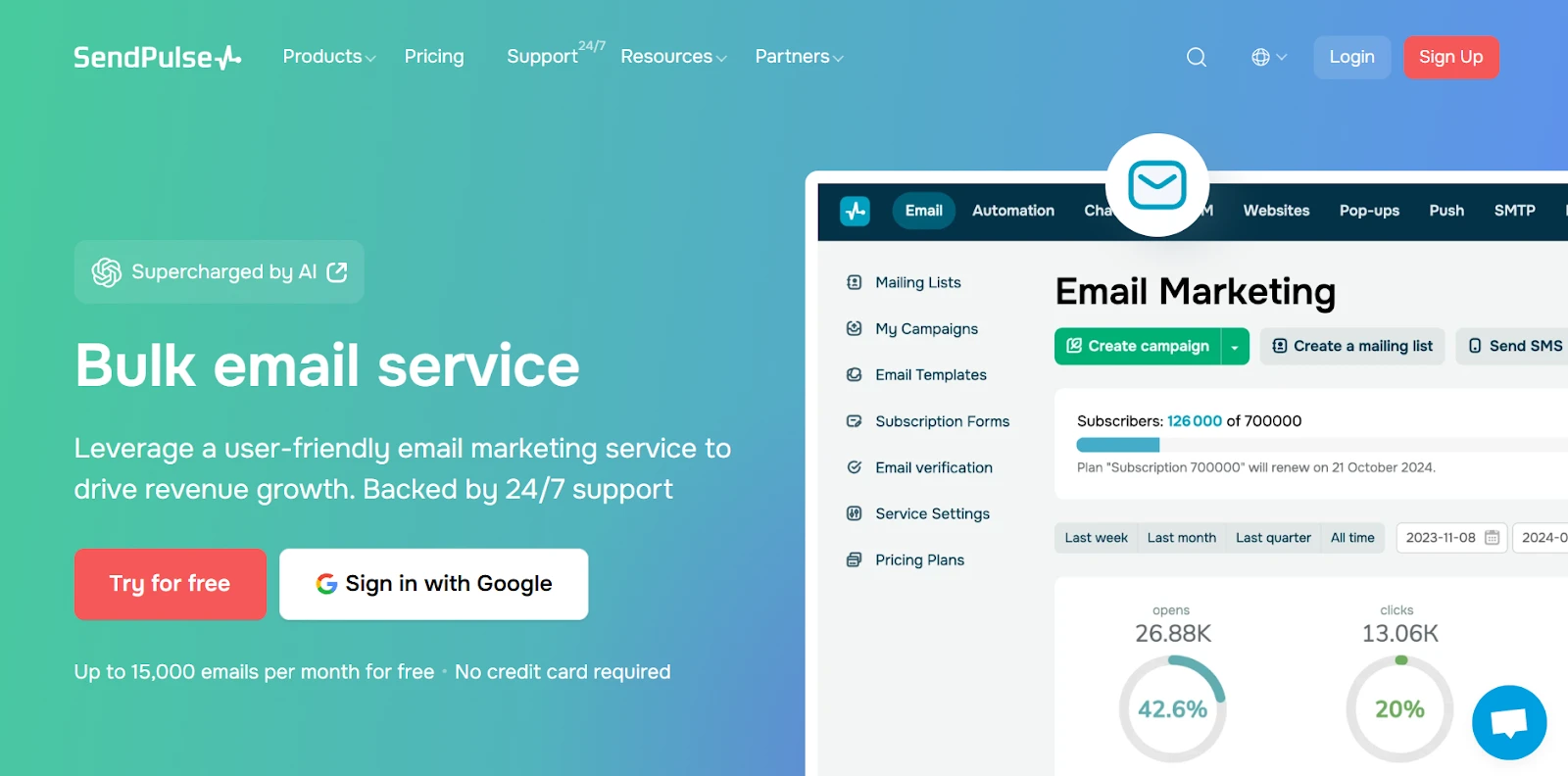
The drag-and-drop editor is intuitive and beginner-friendly, letting you design professional emails in minutes. You’ll find a wide library of ready-made templates that are responsive across devices, ensuring your campaigns look good everywhere. SendPulse also integrates personalization and segmentation tools, so you can go beyond generic blasts and send messages based on subscriber behavior, location, or preferences. For businesses concerned about deliverability, the built-in email validator cleans lists to remove invalid or risky addresses, reducing bounce rates.
Where SendPulse really shines is automation. With Automation 360, you can create workflows that trigger based on actions like sign-ups, purchases, or abandoned carts. Pair this with the platform’s Customer Data Platform, it’s like CRM that allows you to gain deeper insights into customer journeys, allowing for more targeted and effective campaigns. Add features like a mobile app for on-the-go management, 24/7 customer support via live chat, email, and phone, and a rich library of learning resources, and beginners have everything they need to succeed.
Pricing:
- Free Plan: Up to 500 subscribers and 15,000 emails/month.
- Paid Plans: Start at about $8/month, making it one of the most affordable all-in-one options.
2. ActiveCampaign – Where Email Meets CRM
ActiveCampaign blends email marketing with customer relationship management (CRM), positioning itself as more than just a campaign tool. It’s known for its Customer Experience Automation (CXA) approach, where sales pipelines, marketing workflows, and customer service tools are connected under one system. This integration makes it especially attractive to small and medium-sized businesses that want marketing and sales to work seamlessly together.
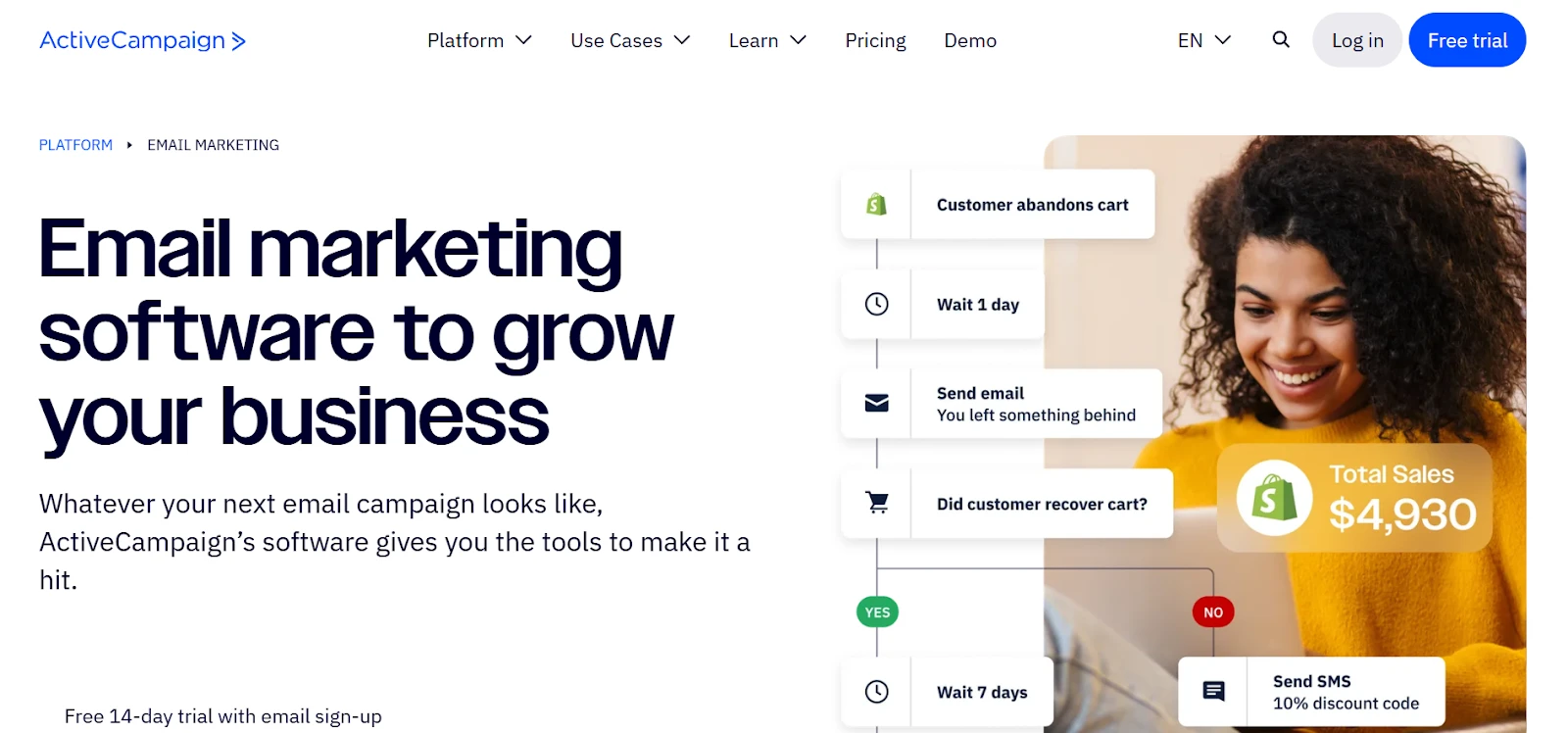
The platform’s strength lies in its advanced automation. Users can design workflows that respond to customer behavior in real time, ensuring subscribers receive timely, personalized messages. Its segmentation tools are among the most granular available, allowing marketers to target audiences with incredible precision. On top of that, ActiveCampaign offers predictive content and sending—AI-driven features that suggest the best time and content to maximize engagement.
For beginners, the platform might feel complex at first, but ActiveCampaign provides training, live chat, and phone support, plus a library of resources to ease the learning curve. Integration with e-commerce platforms like Shopify and WooCommerce makes it a strong contender for online retailers, while its CRM tools benefit service-based businesses that rely on nurturing leads over time.
Pricing:
- Free Trial: 14 days.
- Paid Plans: Start at $15/month.
3. Omnisend – Tailored for E-Commerce Stores
Omnisend is built with e-commerce in mind, and it shows in every feature. From the start, you’ll notice its automation templates for online shops—including abandoned cart reminders, welcome series, and post-purchase follow-ups. These workflows are ready to go out of the box, saving beginners time while addressing the most critical customer touchpoints.
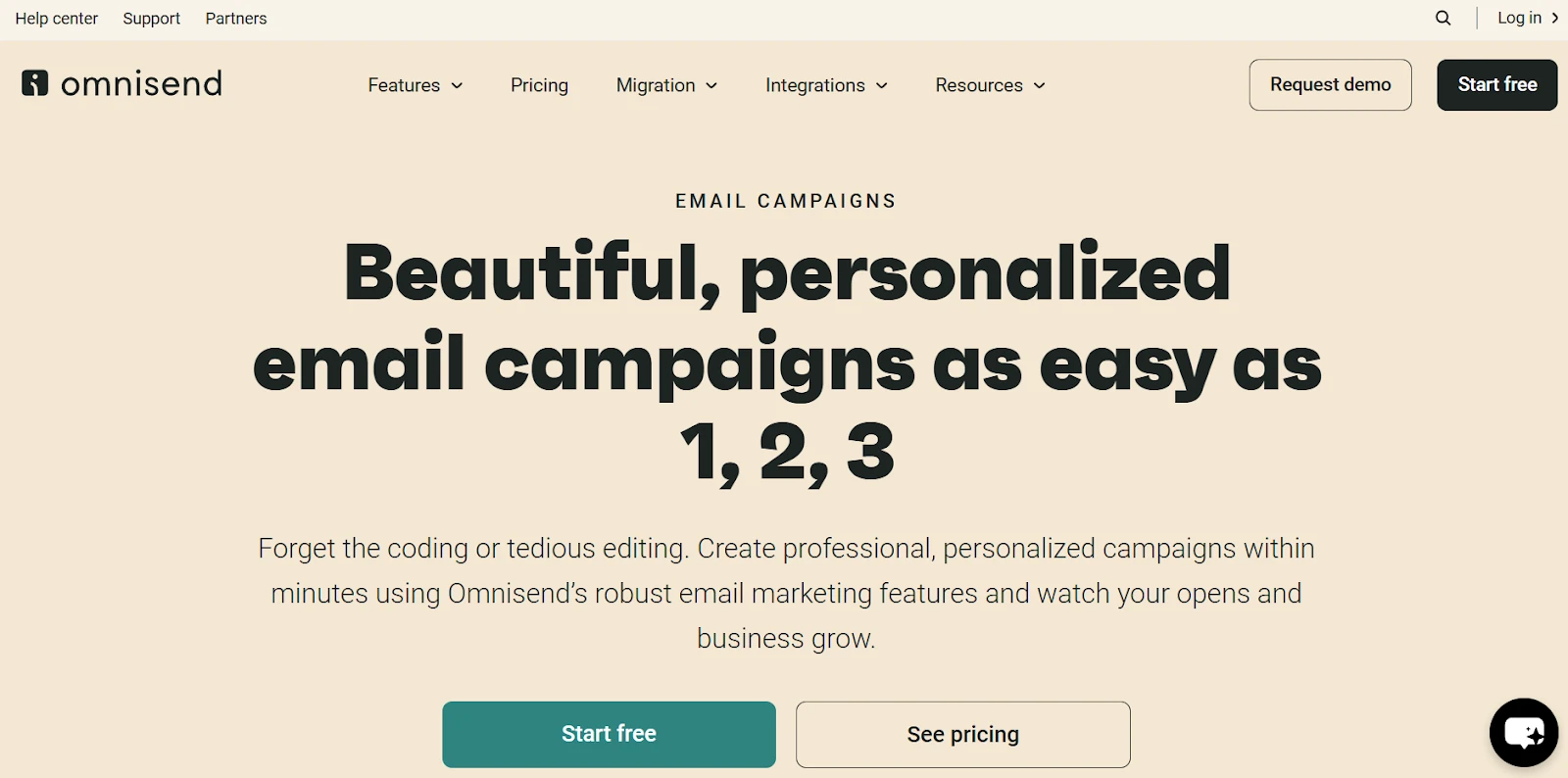
The drag-and-drop editor makes it easy to design emails, and the product picker feature pulls items directly from your store catalog into your campaigns. Beyond email, Omnisend integrates SMS and push notifications, giving online retailers multi-channel reach without extra tools. Its segmentation and A/B testing capabilities allow you to fine-tune campaigns based on engagement and shopping behavior.
Omnisend also provides 24/7 support via email and live chat, with priority options for higher-tier customers. Its focus on e-commerce makes it less versatile for other industries, but if you run an online store, the specialized features can be a game-changer.
Pricing:
- Free Plan: Up to 250 contacts, 500 emails/month, and 60 SMS.
- Paid Plans: Start at $16/month.
4. Benchmark Email – Simple and Straightforward
Benchmark Email appeals to beginners who want a tool that doesn’t overcomplicate things. Its drag-and-drop editor is clean and easy to use, while the platform provides responsive templates that look great on both desktop and mobile. Automation features are simpler compared to enterprise-level tools, but they cover basics like welcome emails and engagement-based follow-ups.
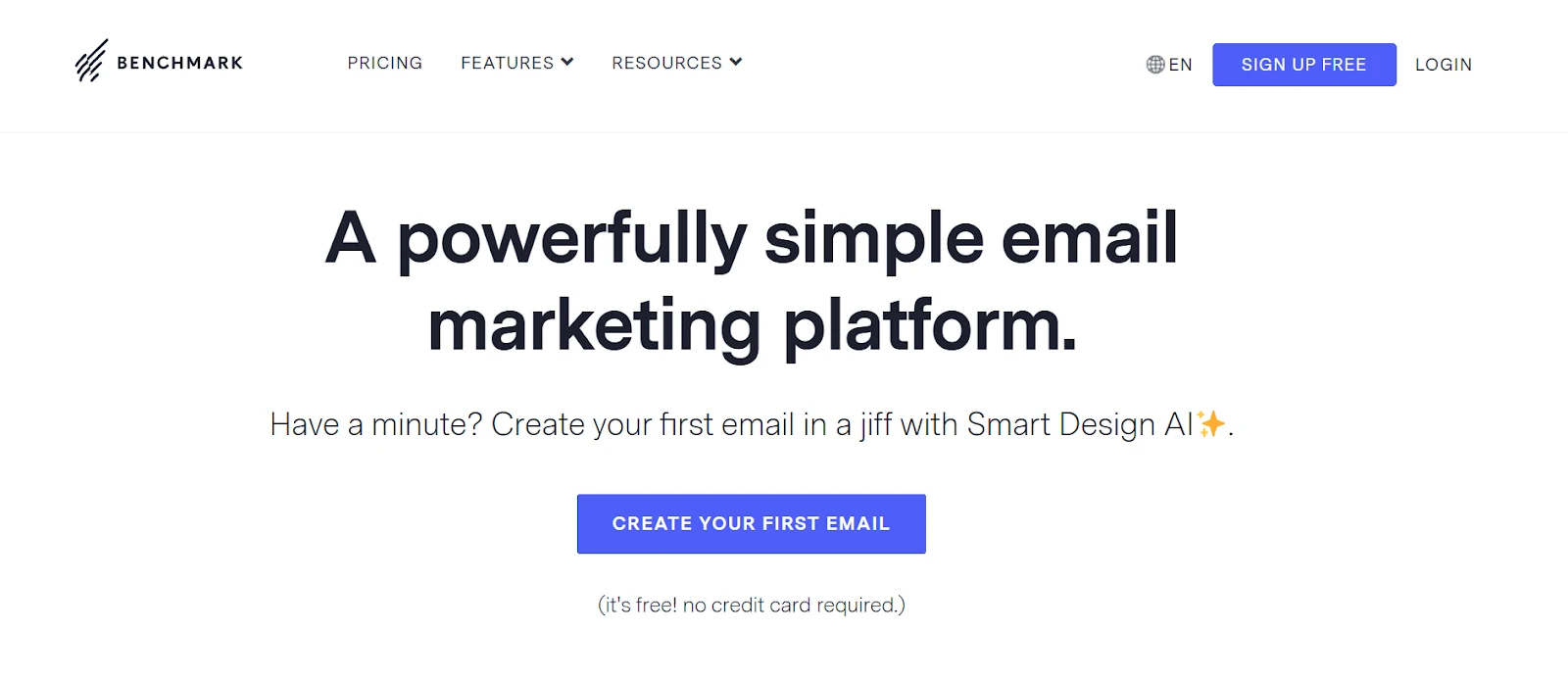
One standout feature is A/B testing, which helps beginners experiment with subject lines, content, and send times to optimize results without needing advanced knowledge. Benchmark also includes survey and polling tools, letting businesses collect feedback directly from subscribers.
Support is another area where Benchmark shines. The company offers 24/7 live chat, phone, and email support, along with a knowledge base full of tutorials and guides. For small and mid-sized businesses, especially those without a dedicated marketing team, this combination of simplicity and support makes Benchmark a solid choice.
Pricing:
- Free Plan: Up to 500 contacts and 3,500 emails/month.
- Paid Plans: Start at $15/month.
5. Netcore – AI at the Forefront
Netcore is a marketing platform that brings artificial intelligence to the center of its strategy. Unlike most beginner-friendly tools, it’s designed for businesses that want to take advantage of AI-driven personalization and engagement. Features like predictive analytics help identify which subscribers are most likely to engage, while AI-based send-time optimization increases the chances your emails will be opened.
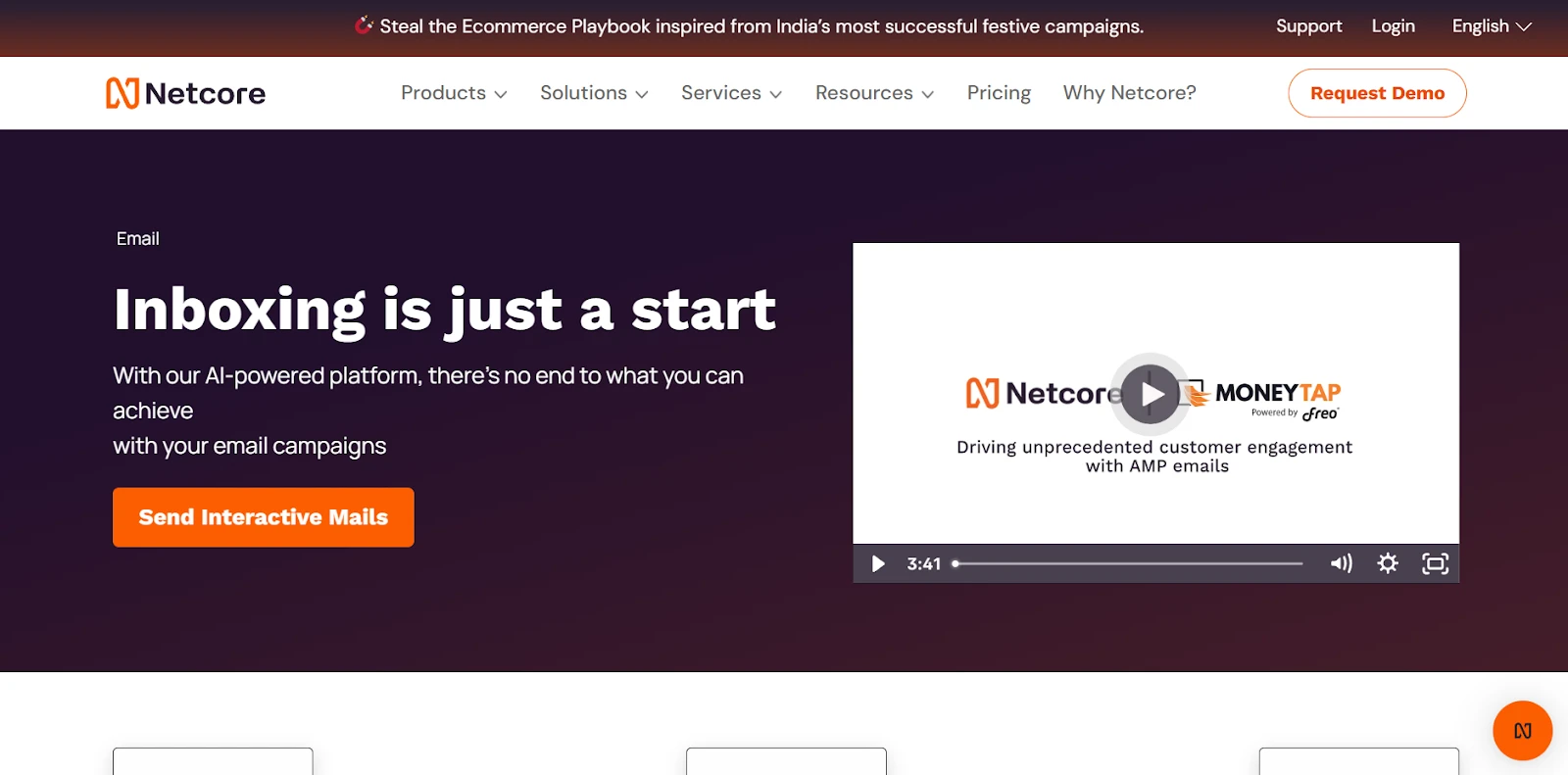
Its visual editor and personalization options enable tailored campaigns, and its AI recommendations even suggest products to individual users. Netcore is particularly strong for industries like e-commerce and fintech, where customer behavior data is abundant and personalization has a direct impact on revenue.
While beginners may find it less accessible than simpler tools, Netcore offers dedicated account managers and training, ensuring businesses get the support they need. Although it’s not the cheapest or most beginner-friendly option, it’s a powerful solution for companies looking to leverage AI early.
Pricing:
- Free Plan: None.
- Paid Plans: Custom pricing for mid-market and enterprise clients.
6. Sendlane – Data-Focused for Online Shops
Sendlane is another e-commerce specialist, but it stands out for its data-driven approach. The platform captures customer behavior in detail, turning that data into actionable marketing insights. Its advanced analytics and reporting help businesses understand what works, and its automation workflows use this data to send highly relevant messages.
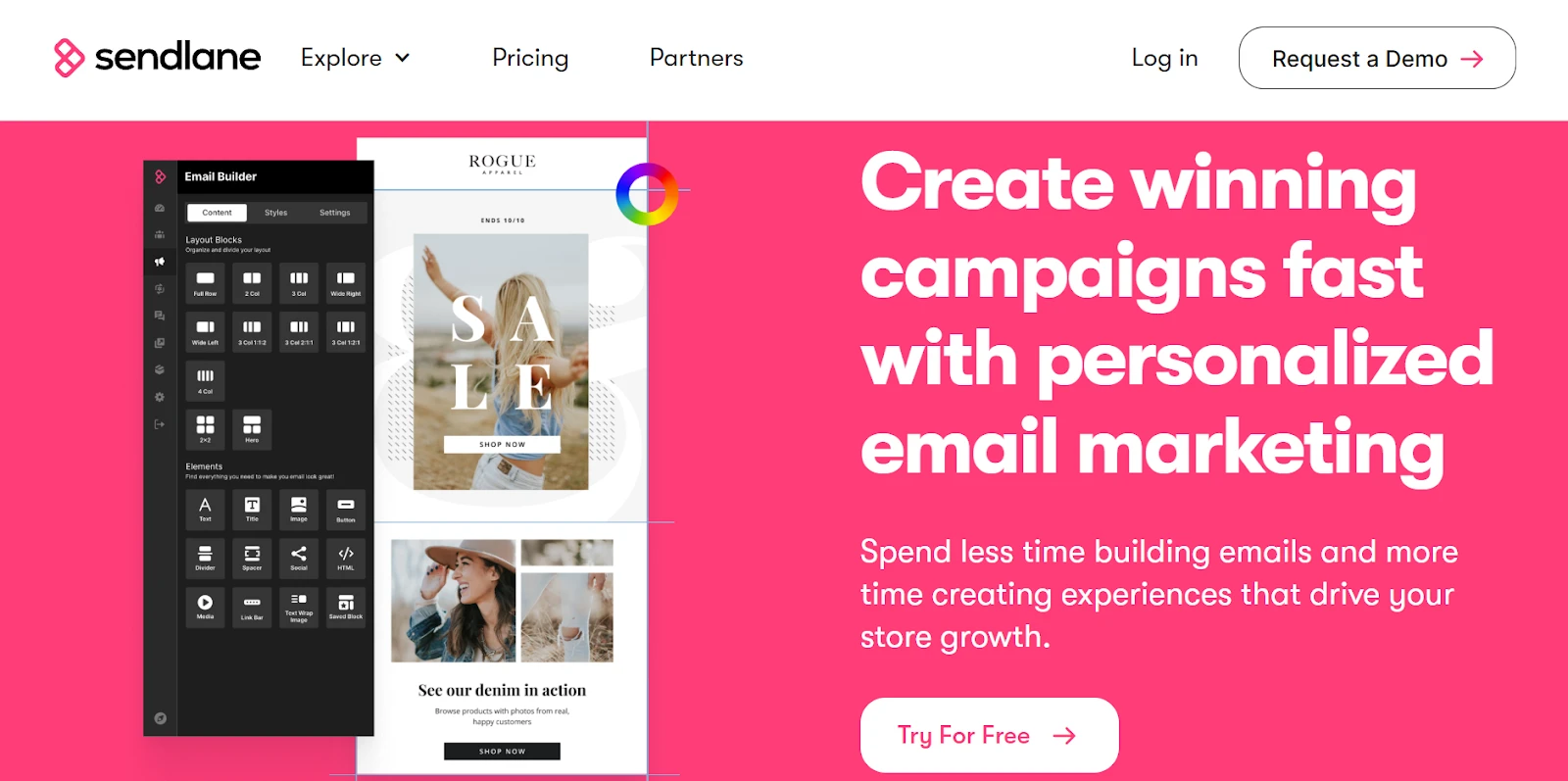
The platform supports both email and SMS, with cross-channel workflows that keep messaging consistent across platforms. Beginners may find the data-heavy interface overwhelming at first, but its clean design helps reduce complexity. Sendlane also provides phone, email, and live chat support, along with onboarding assistance.
It’s a premium service aimed at businesses that want to scale aggressively. Smaller stores may find the entry price steep, but for growing e-commerce brands, Sendlane offers deep insights that can drive substantial revenue growth.
Pricing:
- Free Trial: 60 days (limited to 100 contacts).
- Paid Plans: Start at $100/month.
7. SensorPro – Campaigns with a Data Edge
SensorPro is a platform designed for businesses that value analytics as much as they value design. It offers drag-and-drop editors, A/B testing, and automation, but its real strength lies in the depth of reporting. For agencies and mid-sized businesses, this level of insight can be critical for proving ROI and refining strategy.
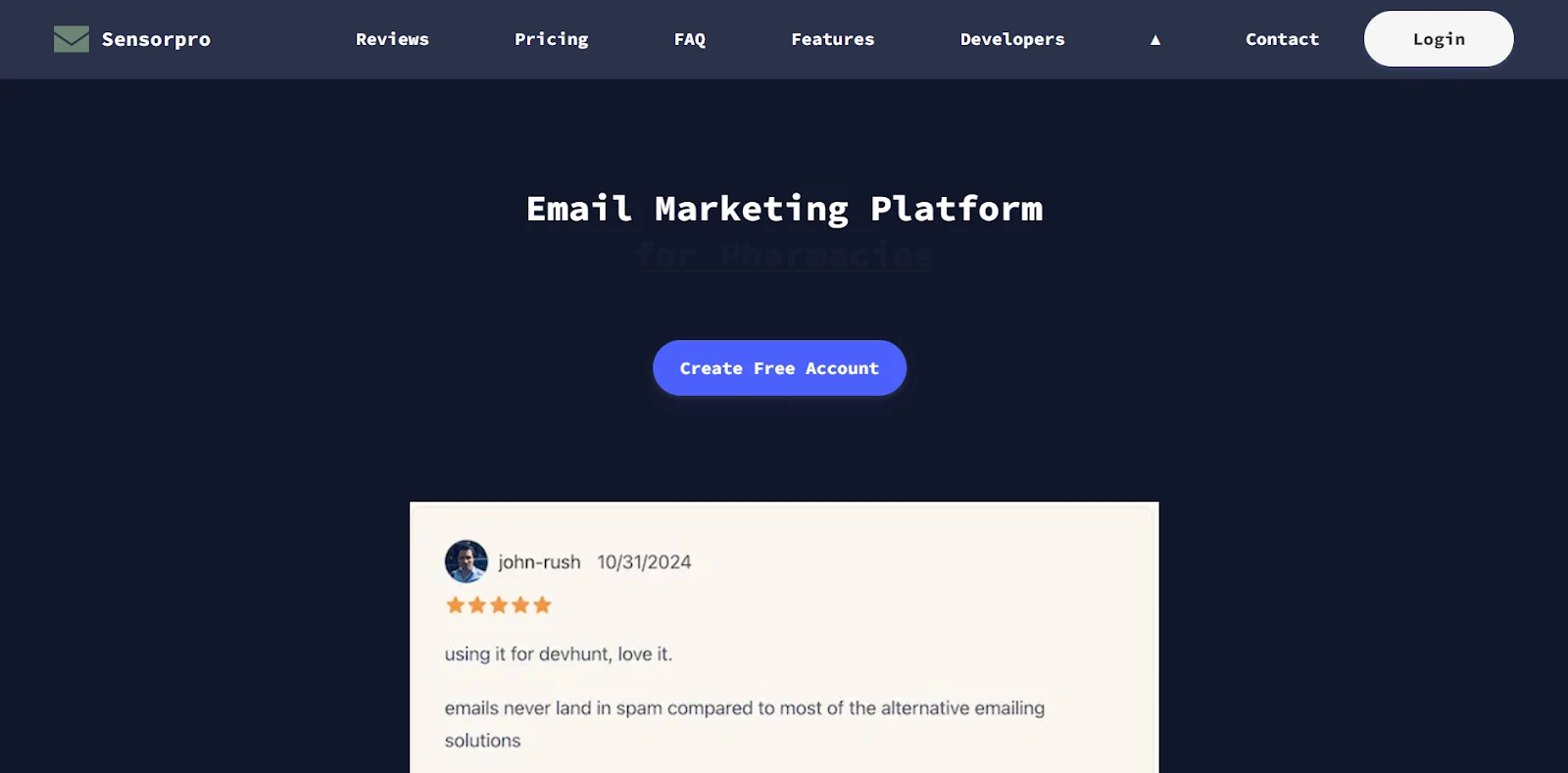
The platform includes survey and polling tools, giving marketers an additional way to gather data directly from their audience. While its interface may not feel as slick or beginner-friendly as some competitors, the platform provides dedicated support to help clients get the most out of the system.
For data-driven beginners, SensorPro offers more than just campaign management—it provides a framework for learning and refining based on evidence.
Pricing:
- Free Plan: None.
- Paid Plans: Custom pricing depending on business needs.
8. SendGrid – Developer’s Favorite Email API
SendGrid has built its reputation as one of the most reliable email APIs for developers, powering transactional emails like order confirmations and password resets. But it also includes a marketing campaign tool with a drag-and-drop editor, making it accessible to non-technical users as well.
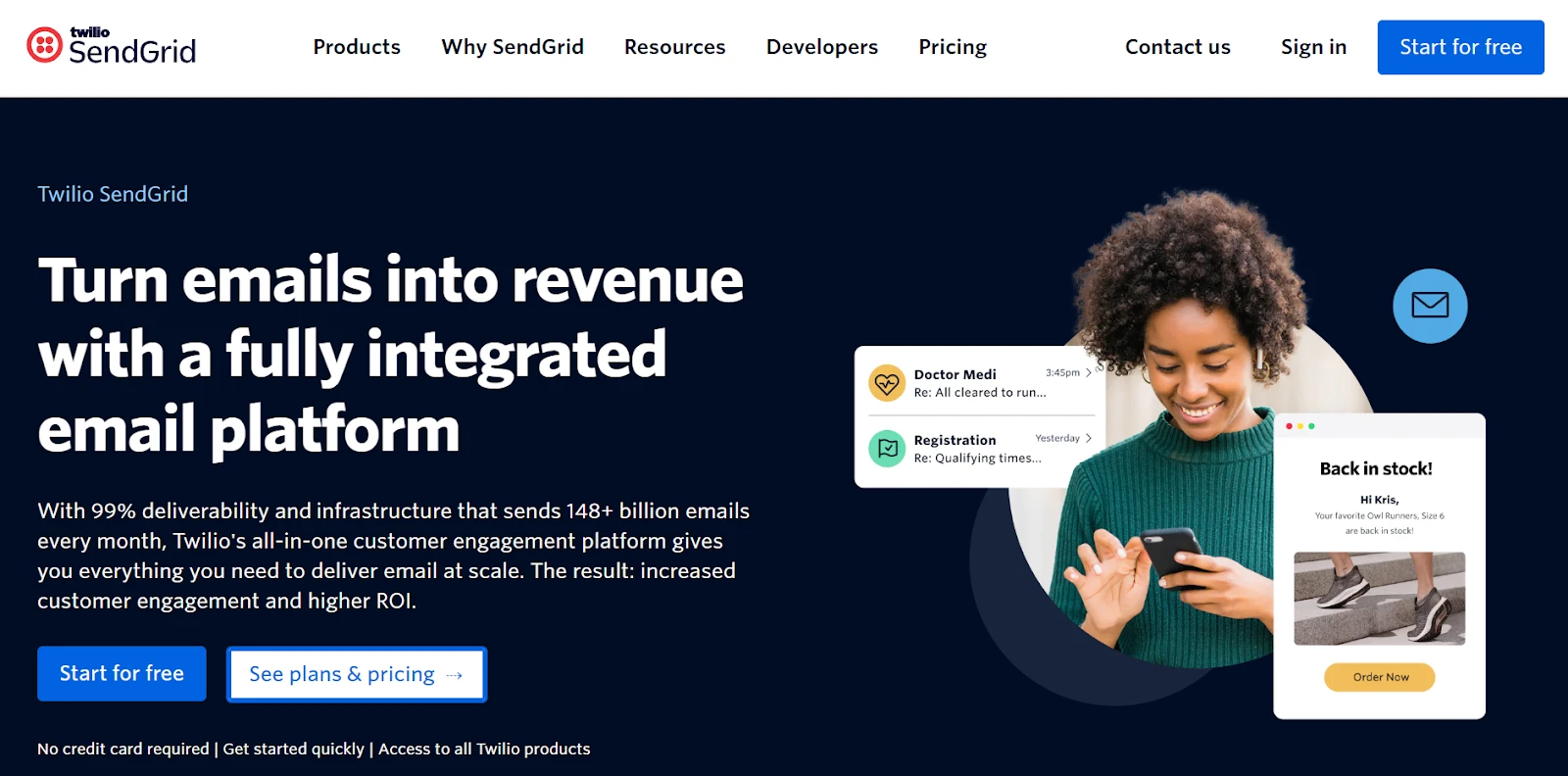
Its strength is in deliverability and scalability. Startups, SaaS companies, and large enterprises rely on SendGrid because it can handle millions of emails reliably. Although the interface may seem technical to beginners, the availability of email validation, templates, and analytics enables you to run marketing campaigns effectively.
SendGrid also offers email, chat, and phone support (depending on the plan), along with extensive documentation. For businesses seeking robust infrastructure with room to grow, this’s a solid choice.
Pricing:
- Free Plan: 100 emails/day.
- Paid Plans: Start at around $19.95/month.
9. Elastic Email – Budget-Friendly with API Power
Elastic Email is a service that caters to both developers and marketers, offering an affordable way to send emails at scale. Known for its API-first approach, it allows developers to integrate reliable email delivery into applications while still providing tools for non-technical users to design and send marketing campaigns. This flexibility makes it suitable for small businesses, startups, and SaaS platforms alike.
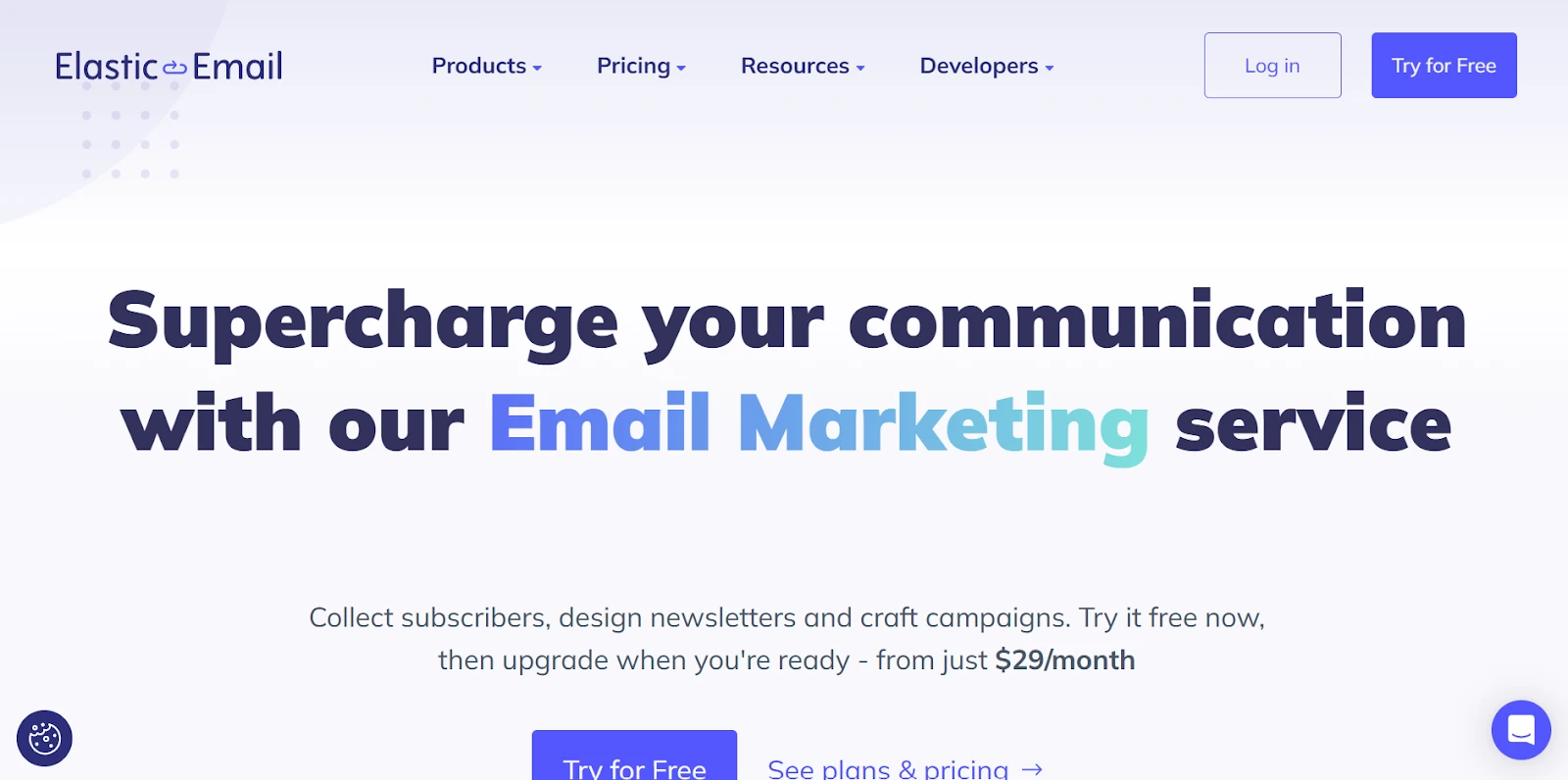
One of its biggest draws is pricing. Elastic Email offers a pay-as-you-go model, with rates starting as low as $0.50 per 1,000 emails. For businesses sending smaller volumes, this can be much more cost-effective than traditional subscriber-based pricing. In addition, it offers a free plan that allows you to send 100 emails per day, providing ample opportunity to experiment and test campaigns.
Features include a drag-and-drop email editor, ready-made templates, list management tools, and analytics. Developers benefit from its SMTP relay and RESTful API, while marketers appreciate built-in segmentation, A/B testing, and campaign reporting. Deliverability is a strong point, backed by reputation management tools and dedicated IP options.
Pricing:
- Free Plan: 100 emails/day.
- Paid Plans: Start at $29/month for 2,500 contacts and 37,500 emails.
10. Privy – Lead Capture Meets Email
Privy is focused on helping e-commerce businesses capture more leads and reduce abandoned carts. Its toolkit includes pop-ups, banners, spin-to-win wheels, and forms that make growing your list easy. Once leads are captured, you can send basic email campaigns for nurturing and cart recovery.
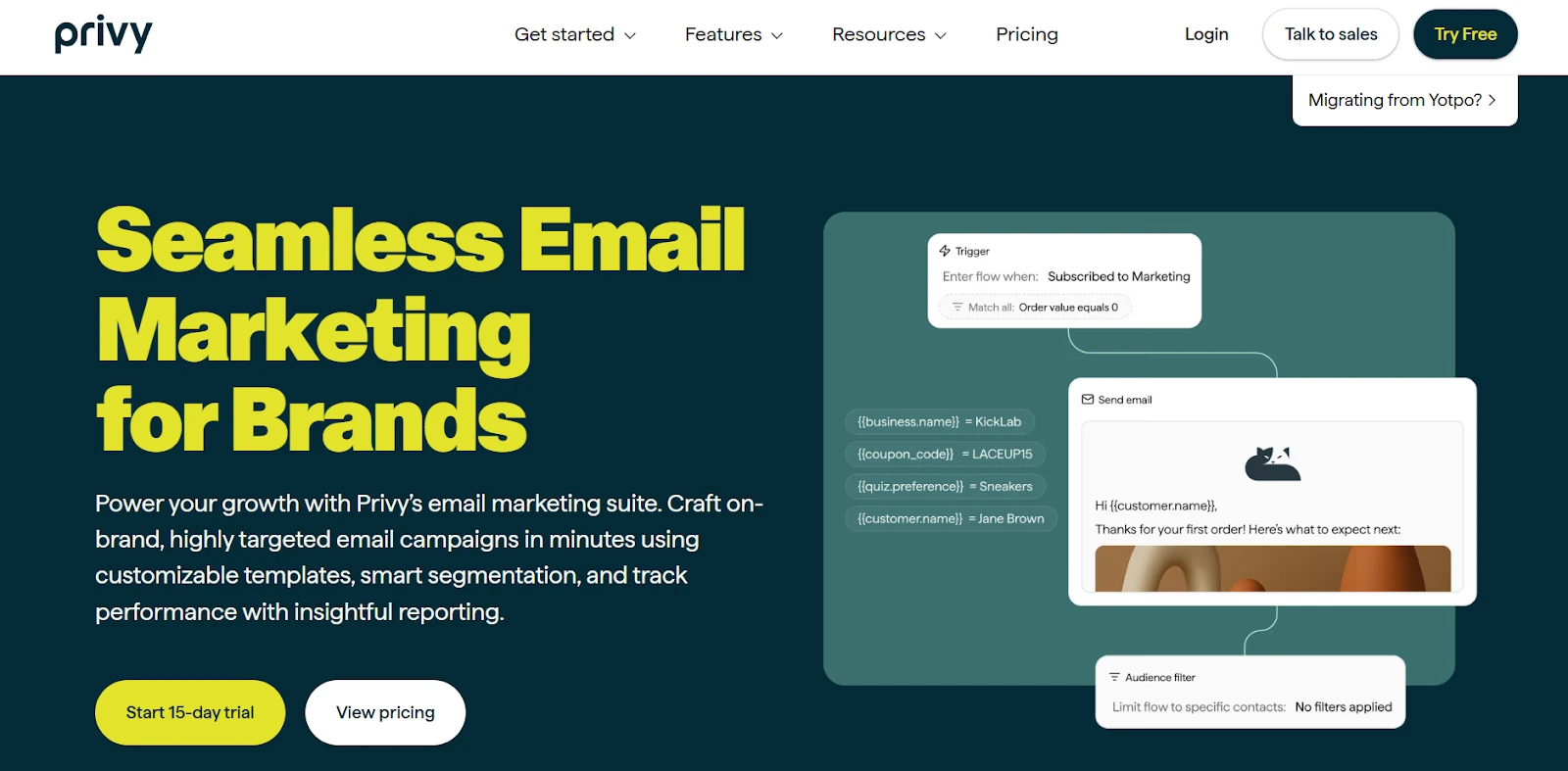
While its email features are not as robust as full-service platforms, its conversion tools make it highly attractive for Shopify merchants and small online shops. Beginners will find the interface simple and the results tangible, especially when it comes to boosting sales from site visitors.
Privy also integrates with popular e-commerce platforms and offers email and live chat support (on paid plans). For businesses looking to start small and focus on conversions, Privy provides an accessible entry point.
Pricing:
- Free Plan: 100 contacts with limited sends.
- Paid Plans: Start at $30/month.
Wrapping Up
Each of the services above brings something valuable to the table. ActiveCampaign is an option for businesses wanting email tied tightly to CRM, there are other good CRM tool options. Omnisend and Sendlane provide deep e-commerce automation, while SendGrid delivers unbeatable developer tools for transactional messaging. Privy and Benchmark Email keep things simple and budget-friendly, while SensorPro addresses niche needs for partners and analytics-heavy organizations. And for companies ready to explore the cutting edge, Netcore offers AI-powered engagement.
But when you weigh the most important beginner needs—pricing, features, and ease of use—SendPulse comes out on top. Its free plan is more generous than most, its drag-and-drop editor and templates make campaign creation effortless, and its segmentation, personalization, and validation tools help ensure results. Unlike platforms that specialize narrowly, SendPulse gives beginners a complete toolkit: Automation 360, a CDP for smarter targeting, omnichannel options like SMS and push, a mobile app for campaign management, and 24/7 support.
In short, if you want to start strong or grow your existing business without overpaying or getting stuck with limited features, SendPulse is the best platform to choose. It’s affordable enough for small businesses, powerful enough for long-term growth, and simple enough that even first-time marketers can feel confident using it.